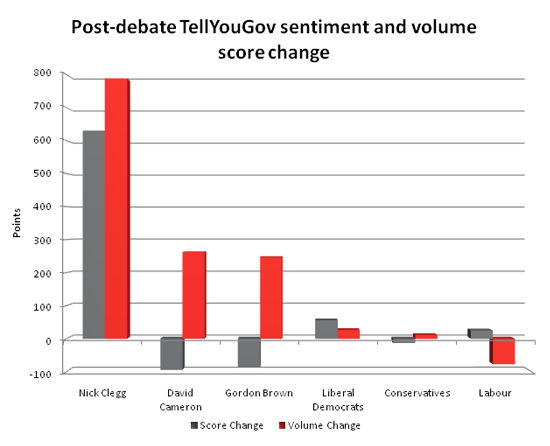The Liberal Democrat leader Nick Clegg, normally resigned to a bit part role during Prime Minister’s Questions, took centre stage last night as multiple polls crowned him as the winner of the UK’s first ever live election debate.
Stopping the spin machines
The debate, which saw Brown, Cameron and Clegg competing for the nation’s votes, also saw polling companies vying for victory in a race to answer the question on everybody’s lips: ‘Who won?’ In 1st place was yours truly – YouGov Plc. We managed to get our results out at least 15 minutes ahead of any other company, producing weighted, representative data on a sample of 1091 people within just eight minutes. Stephan Shakespeare, CEO of YouGov, commented: 'We stopped the party spin machines dead in their tracks, before the spinners could distort media assessments. We made sure the unmediated views of the public were heard, loud, clear and without delay.'
In terms of the actual result, we ’called’ Clegg as the winner within four minutes of the end of the debate; he received a massive 51% of the vote, followed by David Cameron with 29% and Nick Clegg with 19%. Indeed, the Liberal Democrat leader was touted for success by many before the debate but it is unlikely even he himself would have expected such an emphatic statistical win.
Clegg: the fastest mover in leaderboard history
Moreover, since his winning performance, our innovative and unique TellYouGov leaderboard has been on fire. Since the beginning of the debate, the blogosphere (via Twitter, Facebook and the like) has been an overflowing pot of constantly updating sentiment – and we alone at YouGov have the capacity to measure this feeling and filter comments into real, concrete, measurable figures via our TellYouGov tool. Nick Clegg is the fastest moving, highest scoring ‘topic’ ever, storming up the leaderboard in a rapid and unprecedented manner, reaching a never-before-seen volume score of 1000 just before 4pm today, meaning he has inspired more people to have their say than any other political leader so far.
And what they’ve been saying has been overwhelmingly positive. Users, or ‘tyggers’, have applauded Clegg’s performance as ‘impressive’, ‘convincing’ and ‘fantastic’. One tygger responded that Clegg has ‘beat both Cameron and Brown in the TV debate - he might just have persuaded me to change my vote’. And while measuring voting intention in the aftermath of major political events is an unreliable procedure given the tendency for short term emotive and reactionary swings, the result bodes real promise for the Liberal Democrats and posits major implications about voting intention. For example, should the Lib Dems make gains in marginals, would they take seats from Labour or the Conservatives, or both? For issues such as this, the televised debate has provoked more questions than answers.
While one respondent described him as ‘not a world leader’, the MP for Sheffield Hallam has seen the single largest swing of volume and score on the TellYouGov leaderboard since its inception two months ago. As the graph below makes clear, at 8.30pm last night, just before the debate started, Nick Clegg recorded a sentiment score of 50 and a volume score of 201. At the time of writing his sentiment score is recorded at 707 and volume at 1024, and still rising - an incredible rise of +657 in score and 823 in volume in just 18 hours.
What about Cameron and Brown?
Understandably, all parties have been ‘claiming’ debate victory, with George Osborne, Alan Johnson and Liam Fox all making the case for their respective party leader’s performance. However it is David Cameron who may be the most disappointed. Perhaps burdened by high expectations, the Conservative leader’s performance while measured, failed to make an impression on our tygger panellists with many describing his performance as ‘underwhelming’, ‘disappointing’ and even ‘uncomfortable’. While his performance was lamented, it appears to have had only a modest effect on his TellYouGov sentiment score: as the graph illustrates, at 8.30pm last night he recorded a score of -80 and by 2pm this afternoon, that had only dropped 94 points to -174, largely due to an underwhelming amount of people commenting on him.
Equally unimpressive among our panel of tyggers was Gordon Brown, for whom this was, many would argue, a missed opportunity to turn public opinion. Tyggers rounded to condemn his performance as ‘insincere’, ‘misleading’ and one disgruntled respondent viewed his performance as ‘rude and slightly weird’. His performance also saw a drop in his TellYouGov sentiment score from -245 at 8.30pm last night to -332 at 2pm this afternoon; a drop of 87 points - only seven points fewer than David Cameron’s drop in sentiment score.
It must be said that Clegg’s performance, while applauded by the public, was greeted with less enthusiasm by seasoned politicos. Fraser Nelson of The Spectator cited Clegg’s ‘novelty’ as a contributory factor in his win, stating ‘what we political pundits know to be his clichés will be heard for the first time in many living rooms tonight’; while George Eaton of the New Statesman believed he said ‘almost nothing to challenge the perception that he is equidistant between the two main parties’. These criticisms can be viewed as academic however on a night that will be remembered for Nick Clegg’s mastery of the format, as Laurie Penny of the New Statesman has pointed out, ‘throughout his performance, Clegg's eyes were fixed on the viewers at home - the only audience who mattered’.
Nick Clegg will be wary of triumphalism, but for now, this was his moment in the sun. When the dust settles, and the sycophancy wanes, we will be closer to knowing whether Clegg’s performance has in fact ‘changed the dynamic of the election’ as Lord Ashdown would suggest.
Additional reporting by Hannah Thompson
Graphics by Harriet Karwatowska and Patrick Newton









